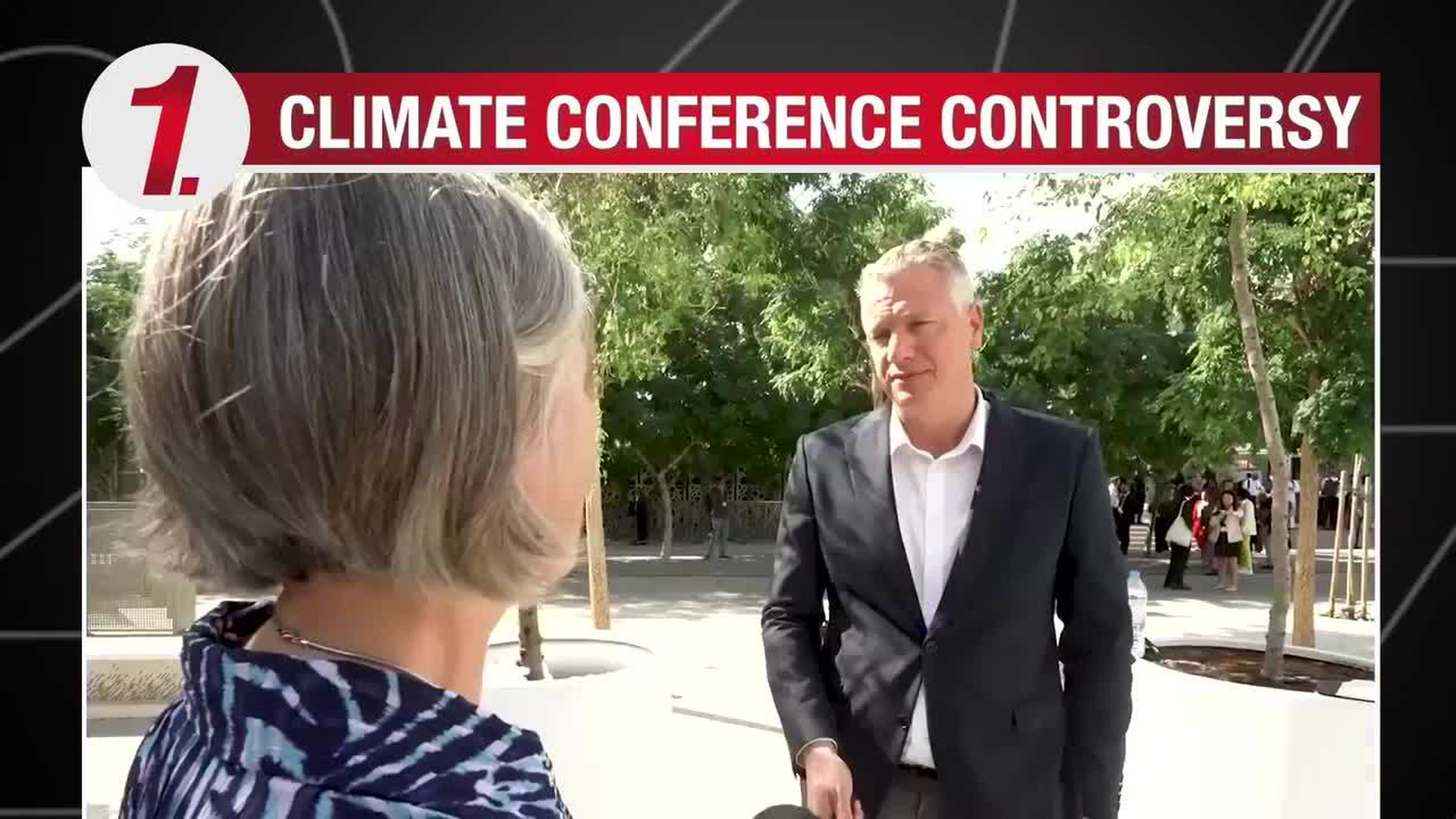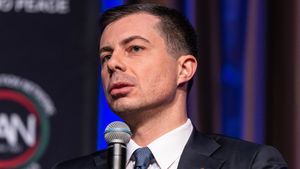Editor's note: Bill McGuire is Professor Emeritus of Geophysical & Climate Hazards at University College London and author of “Hothouse Earth: An Inhabitant’s Guide.” The views expressed in this commentary are his own. Read more CNN opinion here.
(CNN) — Q: How manyclimate change deniers does it take to change a lightbulb?
A: What are you talking about, the bulb is fine.
See, despite the post-COP28 despondency, it is possible to laugh in the face of climate change. In fact, not only is it possible, it is essential.
What we needed from the climate summit in Dubai was a binding commitment to cut emissions in half within six years, so as to have any chance of keeping the global average temperature rise (compared to preindustrial times) this side of 1.5°C, and side-stepping dangerous, all pervasive, climate breakdown.
What we got was a vague intention to transition away from fossil fuels — no timeline, no roadmap. It was the sort of outcome that elicits a chuckle and a shaking of the head in disbelief. But chuckling is a healthy response, even when things seem bleak — especially then, in fact.
Comedy and humor have long been tried and trusted ways of coping with hard times. They can help to relieve stress, distract the mind from the problems of the moment, and bolster general well-being, all things we now need more than ever.
In World War II, comedy was utilised to belittle Hitler and reduce him to a figure of ridicule that morphed him in the public’s perception from a monster into a joke; from someone to be feared to someone who could be beaten. Those suffering the devastating nightly carpet bombing of British cities in 1940 and 1941 fought back in the only way they could, with laughter. The so-called Blitz ‘spirit’ depended upon a good dose of black humor, which I am sure continues to play a key role in lifting the mood, today, in war zones like Ukraine.
Whenever times are difficult, people resort to wit and repartee. The reason is simple. If you don’t laugh, you will cry, and that marks the beginning of a very slippery slope. As civilization faces a threat that dwarfs that of every war ever fought combined, and the outcome of the latest climate COP offers little hope, it’s something we need — not only to remember — but to actively adopt as a weapon in our armory to fight for a better future for our children and their children.
They say that laughter is the best medicine, but weaponized comedy has the potential to do more than just make us feel good. Not only can it help inform and educate about global heating and the climate breakdown it is driving, but also to encourage and bolster action. Fortunately, this is happening.
Because comedy can engage people in ways that other approaches to climate change can’t, it can be an effective way of getting the message across.
This is why ventures like “Climate Science Translated,” which I took part in earlier this year, are so important. The British-based project — brainchild of ethical insurer Nick Oldridge and the climate communications outfit Utopia Bureau — teams climate scientists up with comedians, who ‘translate’ the science into bite-sized, funny and pretty irreverent chunks that can be understood, digested and appreciated by anyone.
Four film shorts have now been made — all of which can be viewed on Youtube — the first ‘starring’ me and brilliant comedian and actor, Kiri Pritchard-McLean.
You can take my word for it, that “we are understating some major potential risks and tipping points.” Or you might prefer Kiri’s translation: “Even the craziest predictions probably aren’t crazy enough. You thought it was bad, well it’s a lot worse than that.” As Kiri pointedly observes: “If comedians are helping scientists out, you know things aren’t going well.”
Elsewhere, a number of stand-ups have devised routines around global heating and climate breakdown — including the excellent Lara Ricote, who won the 2022 best newcomer award at the prestigious British comedy festival, Edinburgh Fringe, and Stuart Goldsmith’s climate-focused “Spoilers” routine, which launched at this year’s festival.
There is even a “Sustainable Stand-up” course aimed at teaching comedy beginners about how climate and social issues can be addressed in their shows, and which has run in 11 countries.
In the US, the Climate Comedy Cohort brings together comedians to develop new routines informed by the hottest climate science, and take their work on the road in a series of live shows and short-form video.
Some climate professionals have even taken things into their own hands, like Scotsman Dr. Matt Winning, who has a PhD in climate policy, and uses stand-up to get his message across: “My idea is that we make more people afraid of flying — so we need to put big glass floors on planes….” It might sound as if plenty is happening but, as the climate continues to collapse about our ears, it is clear that more is needed — much more.
The world’s biggest climate joke has just ended in the United Arab Emirates, where more than 80,000 delegates — including 2,400 from the fossil fuel sector, have conspired to take the mickey.
Nearly three decades of climate COPs have done nothing to reduce emissions, nor rein-in ever-climbing concentrations of carbon dioxide in the atmosphere. The UK Met Office has just predicted that the global average temperature rise could touch 1.5°C next year, yet the COP28 final communique is still banging on about how we can still avoid a permanent rise above this critical threshold, while at the same time failing to show how.
COP28 was always set to be a bit of a comedy show, and one that even the best comic writers would find hard to make up. Held in a major petrostate, the colossal wealth of which is predicated upon fossil fuel extraction, and which has no vested interest in slashing the carbon dioxide emissions that result from burning them, the conference was presided over by the head of the country’s national oil company.
Papers leaked in advance revealed that the UAE planned to use the opportunity provided by the meeting to set up new oil and gas deals, while — half way through — it emerged that the COP president had made a vigorous defense of fossil fuels, arguing that dumping them would see us back living in caves.
You have to laugh — the sort of slightly hysterical laugh that quickly turns to weeping. Oh, and to add to the fun, the host for next year’s COP29 is going to be Azerbaijan — another big oil producer.
Rather than making progress on tackling the climate emergency, then, we are at the very least standing still, and quite possibly going backwards. A role for comedy in helping to turn things around has never been more urgent.
So let’s see more comedians build the climate emergency into their shows, and let’s get the really big hitters involved. Come on Bill Bailey, Lee Mack, Steve Coogan, Ricky Gervais, Jack Dee and the rest. It’s your world too.
And what about a climate sit-com — surely it’s time has come? “Last of the Summer Heatwave” anyone, or perhaps “Only Fools and Climate Scientists”?
I know — “Third Overheating Rock from the Sun.”
The-CNN-Wire
™ & © 2023 Cable News Network, Inc., a Warner Bros. Discovery Company. All rights reserved.
Climate conference controversy

Video Source: Advocate Channel
- How Climate Change Leaves Women at Risk of Domestic Violence ›
- Climate Change Is Having ‘Lifelong Impacts’ on Young People’s Mental Health ›
- Why This Year's World Climate Summit Is on the 'Verge of Complete Failure' ›
- COP28 Leader Stands by Comments Claiming 'No Science' Shows Fossil Fuels Warm the Planet ›


















































